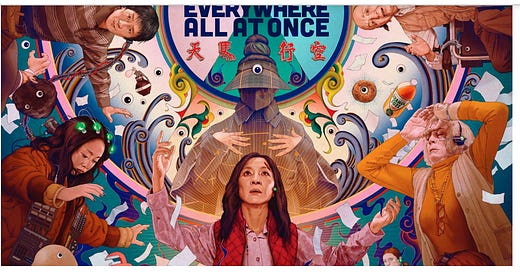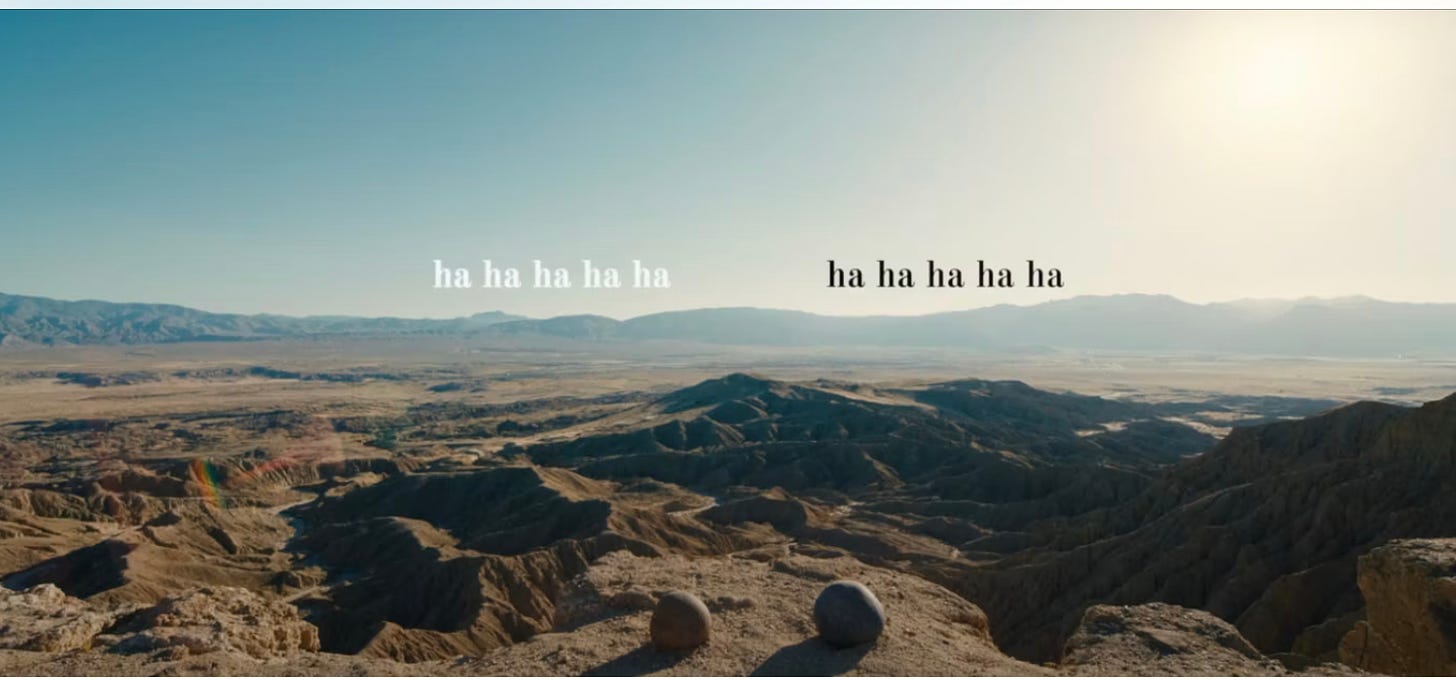Everywhere
Part 1 of a series on this year's Oscar nominated films. This one is on "Everything Everywhere All At Once." Coming next: "An Island off the Coast of Ireland" (on "The Banshees of Inisherin")
When a Facebook friend I admire used the term “metacognitive” to describe Everything Everywhere All At Once I knew I was in trouble again.
I’d been there before, when in the 1980’s academic feminism took a turn into what in those days we called “postmodernism.” We’d barely started to deconstruct the gender biases of the disciplines when suddenly everyone was talking about going “beyond gender” and towards “incalculable choreographies” and “a dizzying accumulation of narratives,” “polyvocality,” and the “disassembled and reassembled, postmodern collective and personal self [which] feminists must code.”
Writing about this turn, I called it the “dream of everywhere,” playing off the old (male) philosophical fantasy of trying to achieve an objective “view from nowhere”—a God’s-eye-view of reality which, I argued, was not only unattainable but arrogant. The thing was, I didn’t see the new “dream of everywhere” as any less presumptuous. I hated the new jargon, too, and the infatuation with “theory”; it seemed too much in love with itself, and had quickly become a required item of intellectual couture. I didn’t get into philosophy in order to wink wink with a new form of intellectual clubbiness. Like many other feminist philosophers of my generation, I had wanted to bring the disembodied arrogance of the discipline down to earth. And now this was happening?
I remembered the feeling of finding myself on the other side of a cultural zeitgeist—one, ironically, not very different from the 1980’s “dream of everywhere,” and not just because of the title--when I read reviews of Everything Everywhere All at Once. Once again, intellectuals seemed to be tripping on multiplicity—and not just the multiverses that the heroine jumps in and out of but the opportunity the film seems to have provided commentators to theory-hop about the film’s themes: “Existentialism.” “Absurdism.” “Performative Nihilism” “Generational Trauma,” “the problem of meaninglessness in an infinite universe.” “Empathy Fatigue” (A new one for me; what is it?) And then, too, a little more au courant: “Depression.” “the immigrant experience.” “Asian-American identity.” And even “ADHD” (which Daniel Kwan, one of the two Daniels who conceived, wrote and directed the film, discovered he suffered from while making the film, and I’m not surprised.) All packed into one film, apparently. Some strange bedfellows there.
I’m not going to summarize the plot for you. It was exhausting enough sitting through the whole movie--something I achieved only on a second viewing, with great effort, a lot of honey roasted cashews, and a warm doggie belly nearby. And ever since, I’ve been trying to figure out why—besides the admittedly wonderful performances—this film has gotten so much praise. The “Asian-American experience” is sketchy at best, consisting of two short book-ends to the hectic, random multiverse-hopping that occupies the bulk of the film (originally planned for Jackie Chan, which possibly tells you all you need to know.) The “generational trauma,” although undoubtedly deeply felt “in real life” by many viewers (including myself, especially when watching the film) doesn’t go much beyond a controlling mother who calls her daughter fat and won’t openly acknowledge her sexuality. Nothing particularly “immigrant” or “Asian” about that. There’s also Evelyn’s father, who bullied her into a life she’s come to regret. Pretty familiar stuff, and any specifically Asian-American detail is sparse. ADHD? I didn’t see where this was addressed so much as symptomatic of the film.
But the film has pretensions beyond the domestic drama/comedy or the genre anarchy. I’ve never seen so many reviews that felt the need to address the question: “What is the deep meaning of this film”? And all, more or less, gave the same answer:
“Reality is just so much lately, and it’s partly in response to that feeling that we’ve seen an increase in a kind of performative nihilism — everything from edgelord meme culture to shitposting to billionaire bunkers and covid fatalism. We see that reflected in the film: Joy’s — er, Jobu Tupaki’s reason for trying to destroy the multiverse is that “nothing matters.”
And when you’re faced with that kind of argument, the only possible answer a hopeful human being can really provide, if we want to not be crushed beneath the weight of the alternate possibility, is: “No, everything matters.”
What better way to show that than through a multiverse where everything, every act and choice, even tiny gestures of humanity or inhumanity, has a ripple effect — not just across lives but across dimensions? Everything, everywhere, all at once, matters.”
Another reviewer put it more concisely:
Though never expressly stated, Everything Everywhere All At Once suggests that what makes life meaningful is the recognition that because there is no inherent meaning, all things and moments are equally meaningful.
One of my FB friends felt that summed the film up well: “When I order a nice piece of fish, why doesn’t the waiter bring me a flaming phone book?” My memoji had a good LOL about that one. But seriously and all kidding aside, the notion that “everything is meaningless so everything has meaning” is basically a justification for anything, and a pretty sophomoric one that sounds pretty close to “If God is dead, then everything is permitted.” I’m sure I heard some version of it many times when I was in high school and hanging out with the guys who read Camus and Kerouac. I found performative nihilism and the exuberance of meaninglessness sexy in those days. In 2023, though, “everything is equally meaningful (because equally meaningless)” doesn’t seem like a very apt answer to the depression and anxiety many of us feel after a decade that brought us ever-mutating COVID, an assault on the nation’s capital by guys in Viking costume, and a demonic idiot in White House. If it’s all “equally meaningful” does it matter who you vote for? Whether or not you get the damned vaccine? And wasn’t it Trump spokeswoman Kelly Anne Conway who came up with the idea of “alternative realities”?
Not every commentator goes so meta. Others view the film’s answer to “nihilism” as much homier. Referencing the classically comedic ending of the film, in which everyone comes out of the chaos and hugs each other, healed (for the moment at least) of their rifts, misunderstandings, regrets, and “intergenerational trauma,” those commentators might as well be describing the end of It’s a Wonderful Life:
“At the heart of the film is the message that family matters, so long as one is willing to listen and approach things with an open heart.”
I’m afraid I’m getting perilously close (or perhaps have already gone over the line) of once again insulting people I care about who loved the movie—including a couple of ex-graduate students of mine, who are teaching it and finding a responsive audience in their students. They suggest a generational difference is the reason the film resonates with their students. Many of them were teens when Trump was elected, and have developed a hopeless cynicism that they long to have some relief from—even if it’s in tired existentialist cliches or warm, fuzzy happy endings. I get the longing, but I’m sceptical about the cure the film offers. And if the appeal is particular to today’s 20-somethings, then why do I feel that I’ve been there, done that—the “absurdity” of it all, the despair, the feeling of being overwhelmed with choices, the “let’s just get stoned and love each other” response to nihilism--in my own twenties? And why, despite the critical acclaim, have so many people I know—of all ages—found it impossible to make it through the movie?
I don’t have an over-arching answer to the questions I’ve posed. But I know that while heady ideas enchanted me at one point in my life (why else would I have gone into philosophy), they are not what I look for in a movie. “The particular greatness of movies,” Pauline Kael once wrote, is the power to connect with us “emotionally…in spite of our thinking selves.” I love that “in spite of.”
It's not that I don't enjoy talking about what "ideas" a filmmaker may have had in mind. But if the ideas are what excites you, you may as well skip the film entirely and enroll in "An Introduction to Existentialism" or "The Postmodern Condition." And it’s pretty clear, despite the well-worn themes—hard to regard “life is absurd” as a fresh new concept in 2023--that having an idea that is “original” is way too important to the Daniels. How else to explain the upset that Daniel Kwan experienced when a couple of other films beat them to the “multiversal concept” of the film:
"Watching the season of Rick and Morty was really painful,” he reports. “I was like, 'They've already done all the ideas we thought were original!' It was a really frustrating experience. So I stopped watching Rick and Morty while we were writing this project."
Hard to imagine Tolstoy being frustrated because other authors had “done all the ideas.” (“Goddamn it, that Frenchman has beaten me to the punch and written a novel about a torturous affair between a married woman and a rake. What am I going to do now?”)
The best scene in the movie for me (and apparently for many others too; they sell t-shirts and posters illustrating it) was when mother and daughter, in one of the many alternative universes, become rocks—a large one that keeps trying to get closer to a smaller one, as the smaller one cringes (internally; the rocks are featureless) and inches away. But they also share a hahahaha text together. And, alone in a silent universe “not conducive to life,” they apologize, reassure, flirt with getting closer, then back away. It’s a moment when the relentless action (and noise!) is put on pause, and—through the dialogue represented in captions—something like the essence of a relationship (both the rift and the attachment) is quietly, brilliantly crystallized. It’s touching, that big rock and that little one, truly speaking to each other (without karate chops, hot dog fingers, or even mouths) on the edge of a cliff, alone together in a vast open space. Those rocks say more about the tender estrangement that exists between mother and daughter than the corny reconciliation at the end of the film. It’s perfect little gem
As far as antidotes to nihilism and absurdity goes, the film is surely right that feeling for and with each other rather than “everything is meaningless anyway” is a better answer. So is the poignancy of art. Except for the rocks moment, I didn’t feel that poignancy in EEAAO. Perhaps things need to be a little less chaotic for me to feel an emotional connection with them. Perhaps they can’t be “everywhere”—that is, all over the place--but have to be somewhere that I am persuaded to care about. Perhaps, in the mysterious ways of art (but not philosophy) those rocks get to us “in spite of” our thinking selves.
NEXT: An Island off the Coast of Ireland. Watch this space!
!
*******************
Sources for “Everywhere”:
Susan Bordo, “Feminism, Postmodernism, and Gender Scepticism" in Unbearable Weight: Feminism, Western Culture and the Body.
Quotes from Reviews (in order of appearance in piece):
Alissa Wilkinson et al, “Why We Loved Everything Everywhere All at Once—and why we hope it wins the Oscar”, Vox, February 4, 2023 https://www.vox.com/culture/23584649-everywhere-oscars.
Ray Eckman, “Everything Everywhere’s Real Meaning Explained”, Screenrant, January 21, 2023 https://screenrant.com/everything-everywhere-all-at-once-ending-explained-real-meaning/
Mae Abdulbaki, “Everything Everywhere All At Once Ending Explained (In Detail),” Screenrant, January 23, 20-23 https://screenrant.com/everything-everywhere-all-at-once-ending-explained-real-meaning/








What strikes me about the film is that it can be seen as nothing but an internal nightmare. Evelyn is tormented by the slow realization that daughter Joy has a girlfriend and Joy has complementary nightmarish thoughts. Note that everything in the universe works out as Evelyn accepts her daughter's sexuality. I'm saying this because I had an experience similar to this when Noah came out as transmasculine. Even though we thought we had fostered a relationship based on honesty, he didn't tell us. We found out through his Instagram account. When I saw that post, I had an experience similar to the montage of faces that recurs through the film. Irrationally, I tried to understand what I might have done to bring this about--my life and its alternatives started to flash in front of me. Once past this, I was able to reconcile with our son and our relationship is better than it has ever been. So, I had a positive reaction to the movie that was personal. I also liked the music and I'm a big Jamie Lee Curtis fan.
Thank you Susan. I posted on my FB page. Keep those reviews coming in!